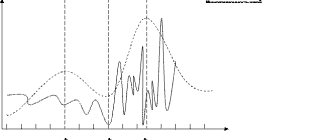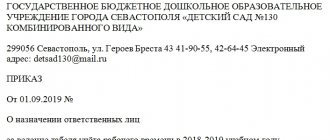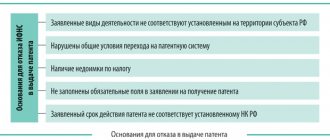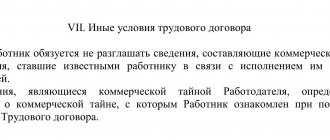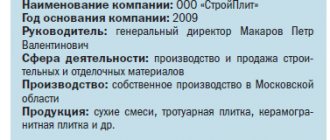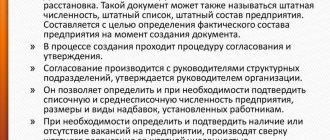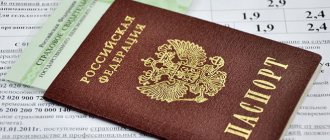Many trade union organizations in Russia, especially in situations of conflict with the employer, have had to deal with management’s refusal to provide a staffing table under the pretext that this document represents a commercial secret.
Recent example - .
Despite the reductions, the administration stubbornly refuses to provide the trade union organization with a staffing table for a joint discussion of available vacancies and the search for opportunities to retain personnel potential.
But let’s figure out what a “trade secret” is and does the staffing table really fall under this definition?
Everything related to trade secrets in Russia is regulated by special law No. 98-FZ. It states that “a trade secret is a regime of confidentiality of information that allows its owner, under existing or possible circumstances, to increase income, avoid unjustified expenses, maintain a position in the market for goods, works, services, or obtain other commercial benefits.”
The owner of the secret himself determines what information to include in a special document called “List of information constituting a trade secret”
and how to protect this information.
The law (clause 2 of Article 3) says: “an entrepreneur has the right to include information of any nature (production, technical, economic, organizational and others) as information constituting a trade secret.” Employers are very fond of referring to this provision of the law... while forgetting that Article 5 of the same law clearly establishes exceptions to this rule.
Among the information in respect of which the employer does not have the right
establish a confidentiality regime, i.e.
What information is considered a trade secret?
The Law of July 29, 2004 No. 98-FZ “On Trade Secrets” recognizes confidential information, the possession of which provides benefits, as a trade secret. For example: production technologies, test results, design characteristics of manufactured products.
Disclosure leads to loss of value of information. In this case, the employer has the right to terminate the employment contract with the violator in accordance with paragraphs. c) clause 6 of Art. 81 Labor Code of the Russian Federation.
Art. 5 of Law No. 98-FZ provides a list of data that is not considered a trade secret when carrying out business activities, among them:
- wage system (clause 5);
- arrears in wage payments (clause 6);
- remuneration of employees of non-profit organizations (clause 9).
Salary is a secret
Why do employers insist that an employee’s salary is a trade secret? Such problems arise often; usually this is done by companies where wages are gray or black, which, of course, is illegal.
Read more: What are the dangers of “black” wages?
Another option why the employer insists that salary information is a trade secret is the likely demotivation of employees: the company manager hopes that by classifying the amount of remuneration, he will insure the team from competition and unconstructive dialogues.
Companies have the right to protect themselves and their valuable resources or information. A law-abiding employer, if necessary, will always explain why it would not like to disclose information about staff salaries, and why this clause is contained in the employment contract. If any clause of the agreement is unacceptable or confuses the employee, you can always ask to change the wording or exclude it from the agreement.
Is it possible to include in local regulations a ban on disclosing salaries?
By prescribing in a local regulatory act a condition on non-disclosure of wages as a trade secret, management is violating the law. What does such a ban mean for an employee?
For example, he is deprived of the right to appeal to regulatory authorities or the court regarding wage issues. And an employee is unlikely to receive even a loan without a certificate of income.
Art. 136 of the Labor Code of the Russian Federation provides for written notification to the employee of parts of his salary. Let’s imagine that the employer considered the salary a secret and marked the pay slip with the stamp “Trade Secret” (without the mark, the document cannot be considered “secret”). It turns out that by going to court and providing a payslip as evidence, the employee violated clause 3 of Art. 11 of Law No. 98-FZ and must be dismissed under Art. 81 Labor Code of the Russian Federation.
Clause 6 Art. 10 of Law No. 98-FZ states that the trade secret regime is not used if it contradicts the rights and legitimate interests of other persons. All this confirms the illegality of management classifying salaries as a trade secret.
What you need to know about wages for employees and employers
There are a number of nuances that should be taken into account in some cases within the framework of labor relations:
- The salary includes not only the salary or wages at the tariff rate. All incentive payments, such as bonuses, are also considered full wages.
- Salary may be below the minimum wage. For example, when an employee works part-time, a proportional reduction in wages will be absolutely legal.
- Knowing the average salary is key to determining different types of benefits, vacation pay and travel allowances.
- Compensatory payments, as well as benefits, are not wages and are not included in it.
- The employer is required to withhold personal income tax from employee salaries. Insurance fees are also calculated based on the employee's earnings.
Protection of personal information
Art. 3 of the Law of July 27, 2006 No. 152-FZ “On Personal Data” refers to personal data about a specific person (subject). Persons who have access to personal data are obliged not to disclose them without the consent of the subject (Article 7 of Law No. 152-FZ).
The employer is obliged to protect the personal data of employees (clause 7 of article 86 of the Labor Code of the Russian Federation).
The person who disclosed the data is held accountable (Article 90 of the Labor Code of the Russian Federation) in compliance with the procedure of Art. 193 of the Labor Code of the Russian Federation: management will have to prove the fact of access to personal data and the fact of their disclosure.
Read about what personal data is publicly available here.
How to correctly refuse to provide information
The company must develop and approve a local regulatory act that regulates the procedure for processing, storing, using and protecting personal data of employees - the regulation on personal data of employees (Article 8, paragraphs 7 and 8 of Article 86, Article 87 and 88 Labor Code of the Russian Federation).
In particular, it is necessary to specify the procedure for transferring personal data of employees to third parties.
Request in writing
In the provision on personal data of employees, it is advisable to establish that the company considers only written requests for the provision of personal data, since with an oral request it is difficult to identify the person who makes the request for the provision of personal data of the employee. See a sample request below.
Written consent of the employee
A separate paragraph of the regulation on personal data of employees should indicate that information can be provided to relatives or family members only with the written consent of the employee himself (except for cases provided for by law).
Please note: the employee himself has the right to determine to which person (organization) he is ready to provide his personal data. It is not necessary that the list of these persons include the employee’s spouse. For a sample of an employee’s written consent to provide his personal data, see below.
Notice of refusal
The provision on personal data should also describe the procedure for the actions of authorized representatives of the company if, by virtue of the law, a positive response cannot be given to the request. In this case, the accountant issues a written notice to the applicant about the refusal to provide the employee’s personal data.
The notification may refer to Article 88 of the Labor Code and the corresponding paragraph of the internal regulations on personal data of employees. See below for a sample notice.
What other information cannot be disclosed?
In addition to personal data, the list of confidential information also includes other types of information. They are approved by the law “On the List of Confidential Information”.
- The secrecy of the investigation and data on the progress of legal proceedings. Federal laws “On the Protection of Judges, Law Enforcement Officials”, “On the Protection of Victims, Witnesses and Other Participants in Legal Proceedings” approve the confidentiality of data regarding persons participating in the investigation of criminal cases.
- Service information. Access to them is limited by the Civil Code of our country. Information of this nature is an official secret and cannot be disseminated without the consent of the owner.
- Medical/notarial/lawyer confidentiality. Access to such data is limited by the State Constitution. Correspondence, recordings of telephone conversations, postal items, etc. cannot be distributed if they acted as a channel of communication between the owner of the information and a person with obligations to maintain professional secrecy in the area of communication with his client.
- Trade secret (limited by the Civil Code of Russia).
- Information about inventions, utility models and industrial designs.
You will learn about consent to the processing of user PD on the site from this article, and you will find information about the collection of personal information in a medical institution.
What it is?
Confidentiality is not only a practical term, but also a legal one. Confidentiality is understood as the obligatory obligation of a person who has some data not to transfer it to other persons without agreement with the owner. In practice, relationships of this nature mean that only she will be familiar with the information that a citizen voluntarily transfers to the other party.
It is prohibited to distribute the data; it can only be used for purposes agreed upon with the owner. For example, when an applicant applies to a bank for a loan and provides a package of documents, the financial institution must use the information received only to verify the solvency of the loan applicant (how to revoke the bank’s consent to process personal data?).
Are they classified information?
According to the Decree of the President of Russia dated March 6, 1997, with amendments dated September 23, 2020, personal data is confidential information.
In turn, personal data are considered facts about events or circumstances that will help identify a citizen as an individual to strangers. In 1997, information on acts of civil status in connection with state registration was added to the list of personal data as a separate document.
Read about the correct use of personal data for an employee of an enterprise, and this article talks about the protection of personal data of a legal entity.
Information related to confidential information
Confidentiality of information related to the mediation procedure
The issue of confidentiality of information related to the mediation procedure deserves special attention. During the mediation procedure, the confidentiality of all information related to this procedure is maintained. The mediator has no right to disclose information related to the mediation procedure and which has become... (International negotiations in business and politics)
Privacy and confidentiality of information
In computer science, the concept of privacy has always been considered relevant. In general philosophical terms, this term is interpreted in different ways: both as solitude, and as inviolability of private life, and as the secrecy of personal information. If the individual were just an element of society,... (History, philosophy and methodology of technology and computer science)
Hiring (and documenting) persons whose functional responsibilities will be related to the possession of confidential information
Hiring persons whose functional responsibilities will be related to the possession of confidential information includes the following procedures: – selection of the intended candidate(s) for employment or transfer, obtaining a resume; – study of the resume (and personal file, if a candidate for the position... (Documentation of management activities)
Features of dismissal of an employee with knowledge of confidential information of the organization
Dismissal of an employee who has knowledge of the organization’s confidential information includes the following additional procedures: – the employee writes a letter of resignation with a detailed disclosure of the reason for dismissal and preferably indicating the place of proposed work; – reception by the confidential service... (Documentation of management activities)
Leakage of confidential information
According to statistics, the leak of 20% of business-critical information leads to bankruptcy of the company in 60% of cases. Domestic legislation provides for liability for persons who leak information protected by law. Thus, criminal liability extends to persons... (Electronic commerce)
Comprehensive protection of trade secrets and confidential information
Modern business is primarily about information. A significant part of the success of any organization depends on its reliability, safety and confidentiality. And what is valuable can always become the object of attacks by ill-wishers, the so-called unauthorized ones... (Innovation management)
Protecting the accuracy, safety and confidentiality of information
Measures to protect the reliability of information Loss of information reliability during its processing is caused by insufficient accuracy or errors in the source data, rounding of intermediate and output calculation results, errors of users and service personnel, interference, failures and... (Informatics)
Confidentiality of information about the recipient of social services.
1. Disclosure of information classified by the legislation of the Russian Federation as information of a confidential nature or proprietary information about recipients of social services by persons to whom this information became known in connection with the performance of professional, official and (or) other duties is not permitted... (SOCIAL WORK THEORY)
State authorities are vested with a certain competence to ensure the regime of confidential information.
In particular, public authorities are obliged to ensure the protection of information obtained legally from disclosure and misuse when officials perform their official duties. State and municipal employees without the consent of the holder of confidential information... (LEGAL)
Non-confidential information
Pochinok worked at McDonald's
Confidential production information is considered to be information on the development and use of software and various technical inventions, methods of manufacturing certain types and brands of products (from confectionery to building mixtures), methods and methods of using technological processes and devices that are not subject to patent protection.
In accordance with Art. 135 of the Labor Code of the Russian Federation, remuneration systems, including tariff rates, salaries (official salaries), additional payments and allowances of a compensatory nature, including for work in conditions deviating from normal conditions, systems of additional payments and incentive allowances and bonus systems, are established by collective agreements, agreements, local regulations in accordance with labor legislation and other regulations containing labor law norms.
Categories of employees who have access to confidential data necessary for them to perform their job duties must be familiar with the Regulations.
However, not everyone and not always succeeds in achieving this. How to keep a trade secret from government agencies is an even more complex and ambiguous question.
Violation
For disclosure of information and distribution of documents containing confidential information, a citizen may be subject to disciplinary, material, administrative and criminal liability, depending on the severity of the offense.
Dissemination of data, access to which was limited by federal law, entails administrative liability (Article 13.14 of the Code of the Russian Federation on Administrative Offences).
A citizen in the Russian Federation will have to pay a fine of 500 to 1,000 rubles, the fine for officials, including lawyers, increases to 5,000 rubles.
For disclosing commercial, official or state secrets, an employee of an enterprise will face disciplinary liability provided for in Articles 57, 81, 192 and 193 of the Labor Code of Russia. Disciplinary sanctions are provided:
- Comment.
- Rebuke.
- Dismissal (Under Article 81 of the Labor Code of the Russian Federation “Termination of a contract at the initiative of the employer”).
If the dissemination of information causes harm to the enterprise, financial liability arises. Articles 232 and 238 provide for full compensation for losses. If the disclosure of confidential data results in property or property damage, the injured party may seek compensation through legal action.
The onset of criminal liability is associated with the issuance of information classified as “state secret” to a foreign state, organization or citizen.
According to Articles 283, 284 and 275 of the Criminal Code of the Russian Federation, the following punishment is provided for the offense - imprisonment for a term of 12 months to twenty years, depending on the circumstances.
An additional fine of up to 500,000 rubles or wages for a period of up to 3 years is imposed.
As you can see, the legislation of the Russian Federation protects the confidentiality of information, and citizens who experience violations can defend their rights and receive compensation. Take advantage of your opportunities, as you know, information in the modern world has already become one of the most expensive capitals, and it must be protected.


